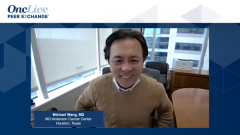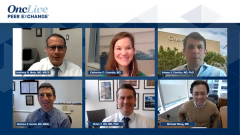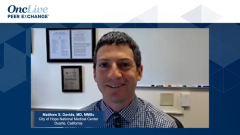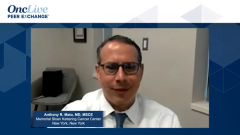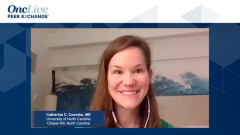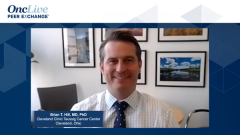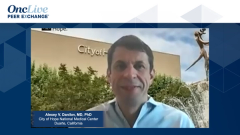
Closing Remarks on Upcoming Data and Future Perspectives in MCL and CLL
Looking to the future, a panel of experts offers closing remarks on research in CLL and MCL including hopes for further data on bispecific antibodies, BTK degraders, CAR T-cell therapy, and pirtobrutinib.
Episodes in this series

Anthony R. Mato, MD, MSCE: In the last section, we’re going to quickly go through a couple of different classes of therapy. Matt, I’ll start with you. Bispecific antibodies in CLL [chronic lymphocytic leukemia], are you excited, are you not? Tell me what data you’re looking forward to.
Matthew S. Davids, MD, MMSc: Yes, I am excited. I’m a little cautiously optimistic based on some of the issues I raised before about the fitness of T cells in CLL, but perhaps with bispecific antibodies, we can help to overcome that, particularly with combinations. We’ve seen a hint of data with epcoritamab in CLL, which look good so far. I’m also excited about data coming along for mosunetuzumab. Then there are some earlier molecules that are exciting. One, for example, we’ve seen a press release on LAVA-051, which is a Gammabody. It’s designed to bring gamma delta T-cells in proximity to type 1 NKT [natural killer T] cells to kill CD1d-expressing cells. CLL is a disease that expresses that. There’s a phase 1b study ongoing with that drug in a variety of hematologic malignancies. In CLL, it’s going to be interesting to see how these drugs perform, particularly in that double-refractory population, post-BTK [Bruton tyrosine kinase], post-BCL2 [inhibitor]. [I’m also interested in] whether there might be a consolidation strategy with these drugs, for example, in patients who have a good response to initial therapy but still have residual MRD [minimal residual disease]. Could you potentially add on a bispecific antibody at that point, clear MRD, and get patients off the medications?
Anthony R. Mato, MD, MSCE: I’ll comment on the BTK degraders or the PROTAC [proteolysis targeting chimeric] degraders. There are a few that are in development, which is really exciting. They use the machinery within the cell to degrade proteins in a targeted way. There were trials in progress for NX-5948, which was a pure BTK degrader; the NX-2127, which degrades cereblon and BTK. Then there’s a new one, BGB-11417. At this point, there are essentially no data to support their use, but there is interest because as we learn more and more about the mechanisms of resistance to the covalent and noncovalent inhibitors, there’s opportunity to overcome that resistance. In CLL, this is a hot topic, but [it is] not yet substantiated by data to support their use. Michael, anything to add about degraders in mantle cell lymphoma?
Michael Wang, MD: We are doing 2 clinical trials, the big one [is studying] the newer BTK inhibitor; the other one is the BGB inhibitor. Those data are too early, [but] we do see some activity by the way, I can see. I have a feeling [about] the BTK degrader; BTK is essential, not only for mantle lymphoma cells to survive but also for the normal B cells to survive. I have the feeling that we are inhibiting with the noncovalent pirtobrutinib, [which] is good, but if you totally get rid of the target, we are going some to some extremes. We may have extremely good efficacy, [but] we may also have extreme toxicity. That’s one of my concerns, so I’m watching it very closely [in] other people’s patients and my patients.
Anthony R. Mato, MD, MSCE: I completely agree with you, Michael. Alexey, I asked you about roaring into mantle cell lymphoma. I suspect the engine has less fuel in it in CLL. Comment on ROR1 as a target in CLL data so far.
Alexey V. Danilov, MD, PhD: In CLL, the ROR1 target has been a little less exciting than in mantle cell lymphoma. For the sake of time, I guess I’ll leave it at that. So far, the durability of responses has been somewhat disappointing, and in the field that we are in with multiple novel agents emerging, it may be a bit of an uphill battle for that particular pathway in CLL.
Anthony R. Mato, MD, MSCE: Last question, [so] keep the answer as brief as possible. We’re 6 months away from the ASH [American Society of Hematology annual meeting], believe it or not. In 1 word or 1 sentence, what are you most excited to see in the next 6 months in terms of new data? What do you really want to see? Matt, we’ll start with you.
Matthew S. Davids, MD, MMSc: I’m going to say bispecific data in CLL.
Anthony R. Mato, MD, MSCE: Alexey?
Alexey V. Danilov, MD, PhD: Yes, I agree with that.
Anthony R. Mato, MD, MSCE: Brian?
Brian T. Hill, MD, PhD: I’d like to see longer follow-up with CAR [chimeric antigen receptor] T-cell therapy.
Anthony R. Mato, MD, MSCE: Michael?
Michael Wang, MD: I’d like to see pirtobrutinib in mantle cell lymphoma with longer follow-up or more patients treated [to see] if the data will hold up, especially whether the durability is an issue.
Anthony R. Mato, MD, MSCE: I’ll say I want to see all of the above. I’d like to go to a session where I see long-term pirtobrutinib in CLL, degraders, bispecifics, and then finally some patients added to the data set for the TRANSCEND study. We’ve seen the same few patients presented for 2 years. There have been more enrolled, [and I] would love to see the entire data set to understand how we’re going to use that product for our patients.
I will thank everybody—Matt, Alexey, Michael, Brian, and Callie—for amazing input. This is one of the best conversations we’ve ever had summarizing new data. [I] look forward to someday doing this again together, hopefully in person. [That] would be even more fun. Otherwise, I want to thank everybody for participating. It’s been a great conversation, and thanks so much for the sponsorship for this particular event.
Transcript has been edited for clarity.


